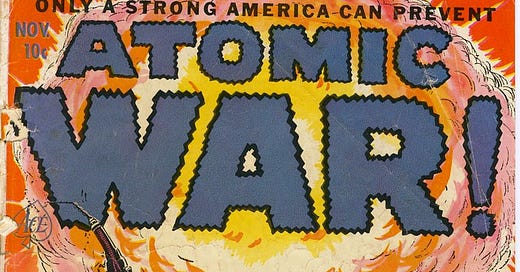👀🌐 Global Eyes: Four horsemen edition
Halfway between Max and Mini, and (almost) all doom.
Items that caught my eye over the weekend:
☢️ Nukes
At Armas—another publication by a Cosmopolitan Globalist favorite, and one we warmly endorse—Joshua Treviño has written a four-part series that’s giving me nightmares. Read it along with this article by Robert Zubrin, if you haven’t read that already. Robert and Josh are both concerned that our nuclear deterrence has been enfeebled by weak signaling. They’re right to be.
Robert:
There is not much time to lose. Putin must be deterred, and at this point, even a strong public statement of consequences might not be enough to do the job. Putin must be convinced that if he does the unthinkable, he will not just have Ukraine, but the United States of America, to contend with.
If we are to avoid a war, we must be willing to show that we are willing to fight.
Joshua agrees:
Part I: The Missiles of October: A self-inflicted crisis of American deterrence.
Part II: The logic of events. Annexation, escalation, and acceleration in a widening war.
Part III: The sum of their fears. The nuclear decision approaches.
Part IV: How we got here. How did American leadership come to accept nuclear war?
Josh also points out this article by a writer who goes by the pseudonym “Policy Tensor.” A Nuclear Zugzwang? How should the US respond to Russian first use?
Josh writes:
I don’t know who “Policy Tensor” is, but this article of his is receiving wide circulation among the commentariat, and it is illustrative of the emerging groupthink on nuclear deterrence, so you ought to read it. I do not agree with it, but it demands consideration and answer.
Meanwhile, here’s Dina Kaphaeva’s latest article: Putin’s New Nuclear Blackmail:
… We know nothing about Russia’s chain of command for launching nuclear weapons, including whether everyone in that chain would obey a launch order. During the 1962 Cuban Missile Crisis, Vasili Arkhipov, a Soviet submarine officer, refused to fire a nuclear missile. Moreover, Putin’s weapons simply fail at times.
Given that the only thing Putin’s cronies truly value is their lives and their wealth, they are probably already looking for the right candidate to succeed him. If his war in Ukraine cannot safeguard their mafia regime, perhaps a successor with whom the West is willing to negotiate can. …
The threat of nuclear war must be taken seriously. But if the West gives in to Putin’s blackmail and allows him to claim Ukrainian lands and declare victory in the war, then the world order as we know it will collapse, entombing hopes for security and respect for international law in the future.
I’ll just add two very mildly reassuring things. First, I think our reader David Harding is correct: Putin doesn’t need to go nuclear. He just needs to go asymmetrical. The far more rational play is to hit the North Sea pipes and the undersea cables.
Second, although I agree that our deterrence has been gravely weakened, I don’t think it’s been weakened by an anonymous leak to the Financial Times. I doubt that will make any difference.
Still, my gut says the odds of Russia using a nuclear weapon in Ukraine are about one in three, one in four—and they’re rising with every Ukrainian battlefield victory and every statement we make that indicates Putin might survive that decision. The odds of a full-on strategic nuclear exchange are much lower, but far too high for anyone to be sleeping well.
My father remarked yesterday that the public seems remarkably sanguine. No one has brought it up in conversation with him, he said. People on the streets seem in a jolly mood. He recalled the atmosphere during the Cuban Missile Crisis: visibly tense, everyone gripped by the news.
I find it strange, too. I don’t know how to explain it. It may be a product of our fractured media environment. It’s possible most people don’t realize how much danger we’re in.
Anyone have a better theory?
👽🛸 Anyway, if the end is at hand (or if an attack on the cables cuts off our communication), let it be recorded, for the edification of the curious interplanetary archeologists who will one day puzzle over the rubble, that my last words were “Subscribe now!”
Think about it: Maybe the bill will never come.
🦠 Germs
Unbelievably, outrageously, the NIH has awarded another massive grant—worth US$3.3 million in the coming five years—to Peter Daszak’s EcoHealth Alliance, so they can look for novel coronaviruses in Southeast Asia.
Keep reading with a 7-day free trial
Subscribe to The Cosmopolitan Globalist to keep reading this post and get 7 days of free access to the full post archives.





